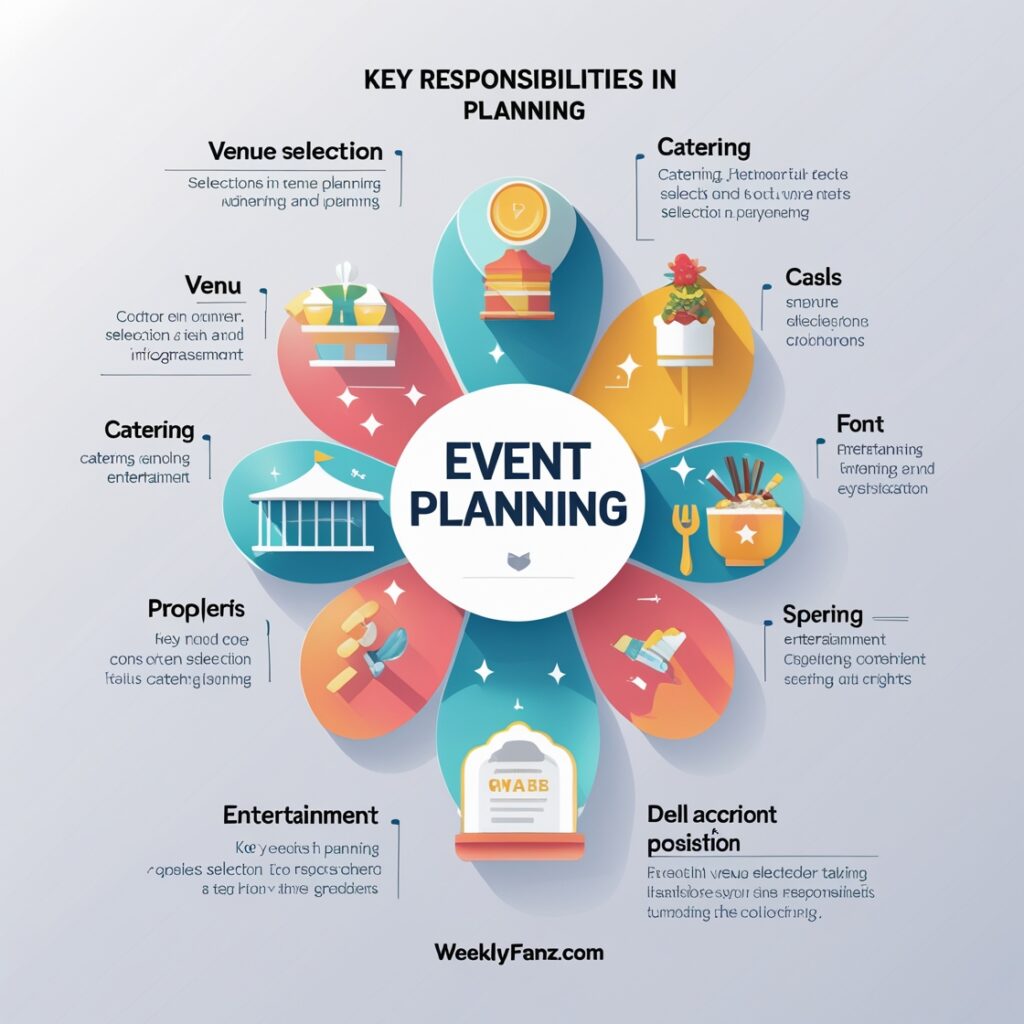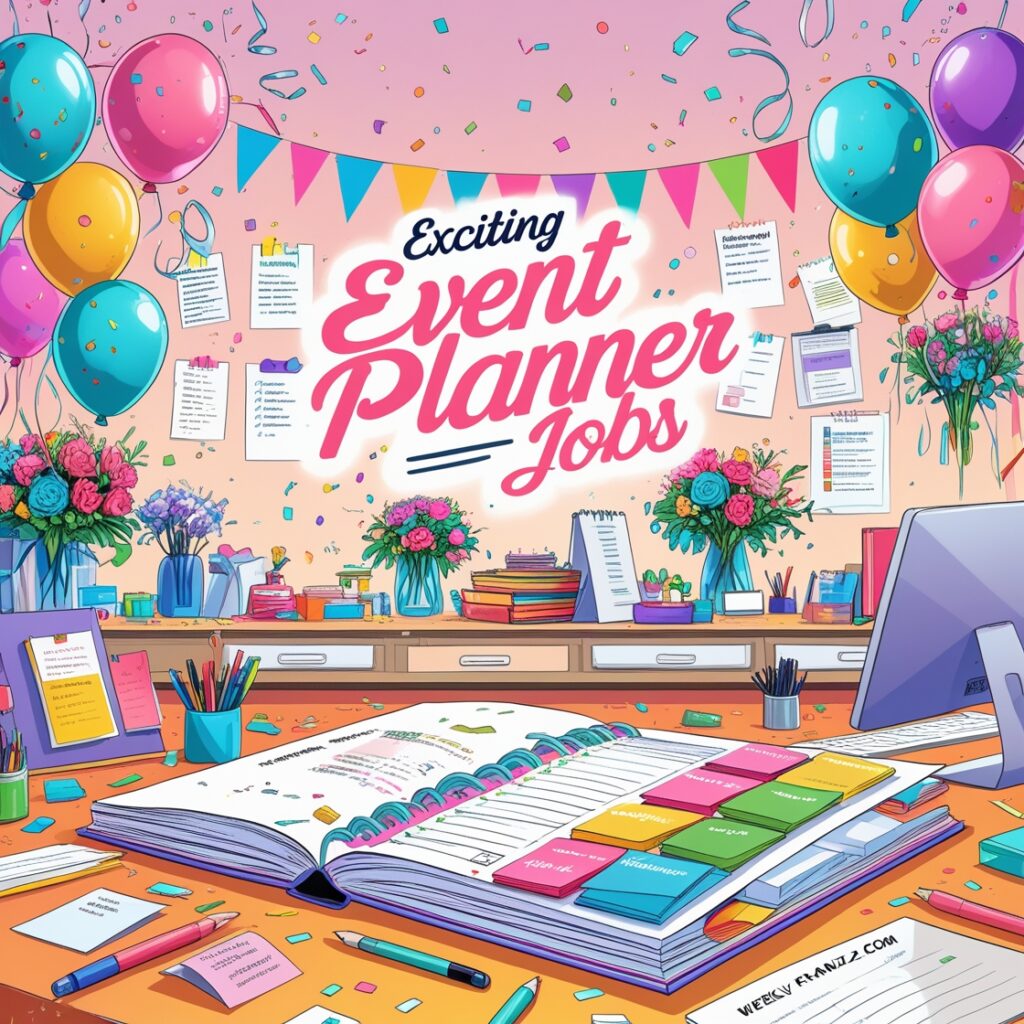The event planning sector is witnessing a notable expansion, with the Bureau of Labor Statistics forecasting an 8% increase from 2020 to 2030. This projection outpaces the average for all occupations, highlighting a surge in demand for event planning professionals. Such growth opens up a plethora of opportunities for those eager to delve into event planner roles, careers, and vacancies within event management.
With the escalating need for adept event planner, the current era presents an opportune moment to contemplate a career in this domain. Possessing the appropriate skills and knowledge empowers individuals to thrive in event planning roles, thereby contributing to the sector’s expansion.
For those contemplating a career in event planning, grasping the industry’s diverse facets is paramount. This includes understanding the myriad of events, the core responsibilities, and the critical skills necessary for success. By delving into these areas, aspirants can make well-informed choices regarding their career trajectories. They can then seek out event management vacancies that resonate with their passions and capabilities.
Key Takeaways
- The event planning industry is expected to grow 8% from 2020 to 2030.
- Event planner jobs, event planning careers, and event management job vacancies are available for skilled individuals.
- Understanding the types of events, key responsibilities, and essential skills is crucial for success in the industry.
- Individuals can pursue event planning careers that align with their interests and skills.
- The industry offers numerous opportunities for growth and development.
- Event planner jobs require creativity, attention to detail, and strong organizational skills.
Understanding the Dynamic World of Event Planning

The realm of event planning is both diverse and dynamic, presenting a plethora of event coordinator positions and job openings for event planners. As an event planner, you may find yourself engaged in a variety of events, ranging from weddings and corporate gatherings to festivals. This diversity is a significant draw, as it enables you to continually face new challenges and hone your skills.
The industry’s expansion has led to a multitude of event planning employment opportunities. To thrive in this field, it is crucial to grasp the fundamental responsibilities of event planning. These include coordinating logistics, managing budgets, and ensuring the seamless execution of events. By refining these competencies and staying abreast of industry developments, you can enhance your prospects for success in this dynamic and fulfilling profession.
Types of Events You’ll Handle
- Weddings and social events
- Corporate events and conferences
- Festivals and large-scale events
Key Responsibilities in Event Planning

As an event planner, your primary duties will encompass coordinating logistics, overseeing budgets, and guaranteeing the smooth operation of events. Effective communication with clients, vendors, and attendees is also paramount. This ensures that all parties’ requirements are met.
Industry Growth and Opportunities
The event planning sector is anticipated to experience continued expansion, with a steady influx of job openings for event planners. By embarking on a career in event planning, you can capitalize on these event planning employment opportunities. This path offers a chance to forge a successful and gratifying career.
Essential Skills for Success in Event Planner Jobs
To excel in event planner jobs, one must acquire a set of skills that facilitate the smooth execution of events. A survey by the International Live Events Association highlights the importance of communication, problem-solving, and attention to detail. These attributes are pivotal in managing event planning job listings effectively, ensuring that events unfold without a hitch.
Key skills for event planners encompass:
- Communication: This involves coordinating with vendors, managing budgets, and ensuring that events meet client expectations.
- Problem-solving: It entails addressing last-minute issues, such as venue changes or catering problems.
- Attention to detail: This skill ensures that every aspect of the event, from decorations to catering, is executed flawlessly.
The increasing demand for skilled event planners, driven by the growth of event production job openings, underscores the need for a robust skill set. Developing a strong foundation in event planning principles, including budgeting, marketing, and logistics, is crucial. Possessing these skills enables individuals to thrive in event planner jobs and secure fulfilling career paths within the event planning sector.
“The key to success in event planning is to be organized, flexible, and creative. By developing these skills, you can deliver exceptional events that exceed client expectations and leave a lasting impression on attendees.”
Educational Requirements and Certifications
In the realm of event planning, a robust educational base is paramount. Many professionals in this field hold degrees in hospitality, marketing, or similar disciplines. Such a background equips them with a comprehensive understanding of the industry. This knowledge is vital for excelling in event planning roles, enabling them to navigate the complexities of event management and organization effectively.
While a degree in a relevant field is advantageous, it is not the sole determinant of success. Obtaining professional certifications, such as the Certified Event Planner (CEP) designation, can significantly boost one’s career trajectory. These certifications serve as a testament to an individual’s expertise and dedication to the profession. They enhance competitiveness in securing coveted event management and organizer positions.
Key Certifications and Education
- Certified Event Planner (CEP) designation
- Degree in hospitality, marketing, or a related field
- Continuing education opportunities, such as workshops and conferences
Engaging in ongoing educational activities, like workshops and conferences, is also crucial. These endeavors keep event planners abreast of the latest industry trends and methodologies. By integrating education, certifications, experience, and skills, individuals can significantly enhance their prospects in event planning careers. This synergy is key to securing premier event organizer roles.
Breaking Into the Event Planning Industry
To excel in event planner jobs, acquiring experience and forging industry connections is crucial. A survey by the Event Planning Association highlights the value of internships or volunteer work as entry points. Such hands-on experiences are pivotal in honing the skills necessary for event coordinator positions. They also enhance your prospects for securing job openings for event planners.
Several strategies can facilitate your entry into the field:
- Engage in networking with industry professionals to stay abreast of trends and opportunities
- Continuously update your knowledge on industry advancements and best practices
- Curate a robust portfolio to demonstrate your capabilities and experience
Securing a job opening for an event planner can be a pivotal moment in your career. Highlighting your relevant skills and experience can significantly boost your prospects in event planner jobs and event coordinator positions. Remain dedicated, persistent, and continually seek avenues for professional development.
As you progress in the industry, remember that event planner jobs and event coordinator positions demand creativity, meticulousness, and superior organizational abilities. Cultivating these attributes and steadfastly pursuing your objectives can lead to success and rewarding job openings for event planners within the sector.
Where to Find Event Planner Jobs in Today’s Market

The event planning sector is expanding, offering a plethora of event planning employment opportunities. Identifying these opportunities requires knowledge of the right sources. Indeed and LinkedIn stand out as premier platforms for event planning job listings. Moreover, specialized websites and professional bodies offer insights into event production job openings.
Exploring the following avenues can be beneficial when searching for event planner roles:
- Job boards: Indeed, LinkedIn, and other prominent platforms
- Industry-specific websites: National Association of Catering and Events, International Live Events Association
- Professional associations: Meeting Professionals International, National Association of Wedding Planners
Engaging with industry professionals can also uncover job openings and new prospects. Participate in events, join professional groups, and connect with event planners on LinkedIn to broaden your network.
By leveraging these resources and strategies, you can enhance your chances of securing a suitable event planner position. Ensure your resume and cover letter are tailored to each application. Be ready to demonstrate your expertise and experience in the field.
Building Your Event Planning Portfolio
A robust portfolio is crucial for event planner jobs, as it highlights your expertise and experience to potential employers. When pursuing event planning careers, a well-rounded portfolio can differentiate you from competitors. It should include past event examples, client testimonials, and any relevant certifications or awards.
Consider the event management job vacancies you aim for when constructing your portfolio. Customize it to emphasize your skills and experience in those specific areas. You can opt for a physical binder or a digital portfolio, based on your preference. Some event planners even create a website to display their work, making it accessible to potential employers.
By developing a strong portfolio, you can showcase your abilities and expertise to potential employers, enhancing your appeal for event planner jobs. It’s important to update your portfolio regularly with new examples and testimonials. This demonstrates your ongoing growth and experience in event planning careers.
Salary Expectations and Career Growth
Exploring event planner jobs necessitates a thorough examination of salary expectations and career advancement prospects. The Bureau of Labor Statistics indicates that event planners earned a median annual salary of $51,560 in May 2020. As professionals accumulate experience and acquire certifications, they can ascend the career ladder, thereby boosting their earnings in event coordinator roles.
Beginners in the field typically start with entry-level positions, which often come with a salary around $30,000 annually. As they gain more experience, event planners can transition into mid-career roles, which span from $50,000 to $80,000 annually. For those who have reached the pinnacle of their profession, senior positions can fetch over $100,000 annually. This makes event planner positions highly appealing for those aiming to climb the career ladder.
Key Salary Ranges
- Entry-level: $30,000 – $40,000 per year
- Mid-career: $50,000 – $80,000 per year
- Senior-level: $100,000+ per year
The escalating demand for adept event planners is mirrored by an increase in career progression and salary potential. Grasping the nuances of salary expectations and career growth avenues is crucial. It enables individuals to make strategic career choices, targeting event planner roles that resonate with their ambitions and aspirations.
Starting Your Own Event Planning Business
For many professionals in event planning careers, the ultimate goal is to start their own business. With the right skills and experience, event planners can succeed as entrepreneurs. They can take on event management job vacancies and create their own event organizer positions. A survey by the Event Planning Association found that 60% of event planners have considered starting their own business. This highlights the potential for growth and opportunity in this field.
To succeed in starting an event planning business, it’s essential to have a solid understanding of the industry and the skills required. This includes financial management, marketing, and client relationships. By developing these skills and staying up-to-date with industry trends, event planners can create a successful and sustainable business. They can fill event management job vacancies and create new event organizer positions.
Some key considerations for starting an event planning business include:
- Developing a business plan and budget
- Building a network of contacts and partners
- Creating a marketing strategy to attract clients
By carefully planning and executing these steps, event planners can turn their passion into a successful business. They can pursue event planning careers and create new opportunities in the industry.
Technology and Tools in Modern Event Planning
The event planning sector is undergoing significant transformation, with technology at its core. For those aiming for event planner jobs, understanding the newest software and tools is crucial. The surge in event planning job listings and event production job openings underscores the growing need for adept professionals.
In our digital era, event planners depend on various technologies to manage events effectively. Key tools include:
- Event management platforms for organizing and coordinating events
- Project management tools for tracking progress and communicating with teams
- Virtual event technologies for hosting online events and conferences
Utilizing these technologies enables event planners to enhance communication, cut costs, and elevate the attendee experience. As the industry expands, the need for tech-savvy professionals will escalate, opening up more event planner jobs and career paths.
Keeping abreast of the latest technologies and trends is vital for success in event planning. By embracing innovation and utilizing the appropriate tools, event planners can create outstanding events. This not only boosts their careers but also enriches the field as a whole.
Also Read:Understanding xResolver: A Comprehensive Guide
Common Challenges and How to Overcome Them

In the realm of event planning careers, professionals encounter numerous hurdles that can affect event success. A survey by the International Live Events Association highlights budget constraints, last-minute changes, and communication breakdowns as major challenges. To triumph over these obstacles, a deep understanding of the event’s goals and a detailed plan are crucial.
Employers in event management job vacancies seek candidates adept at quick thinking and innovative problem-solving. As an event organizer, being proactive, adaptable, and skilled in communication is vital. This ensures that events proceed without a hitch. By anticipating common challenges, one can thrive in event organizer positions and forge a prosperous career in event planning.
- Develop a comprehensive event plan, including contingency plans for unexpected issues.
- Establish clear communication channels with stakeholders, including vendors, attendees, and team members.
- Be proactive and flexible, and be prepared to think on your feet to resolve last-minute issues.
By adhering to these strategies and being cognizant of the typical hurdles faced by event planners, one can position themselves for triumph in event planning careers. This approach ensures success in event management job vacancies.
Conclusion: Taking Your First Steps Toward an Event Planning Career
The event planning industry is a realm of vibrant opportunities, offering a multitude of roles that enable you to bring your creative ideas to life. With the acquisition of the necessary skills, training, and unwavering determination, a fulfilling career in this field is attainable. This path is paved with potential, awaiting your dedication and passion.
Whether your interest lies in the dynamic environment of corporate events, the sophistication of weddings, or the vibrant atmosphere of music festivals, the event planning sector is replete with roles that can spark your enthusiasm. By refining your organizational prowess, perfecting your attention to detail, and nurturing robust client relationships, you will be on the cusp of achieving success in this ever-evolving industry.
As you set out on your event planning career journey, recognize that the journey itself is as enriching as the destination. Embrace the obstacles, remain flexible, and continually broaden your expertise and knowledge. Armed with the insights and guidance from this comprehensive guide, you are now poised to embark on a captivating and rewarding career in event planning.
FAQ
What types of events do event planners handle?
Event planners manage a broad spectrum of events, encompassing weddings, corporate gatherings, and festivals. The field of event planning is both dynamic and diverse, offering a multitude of opportunities to engage with various event types.
What are the key responsibilities of an event planner?
Event planners are responsible for coordinating logistics, managing budgets, and ensuring the smooth execution of events. They must possess exceptional communication, problem-solving, and attention to detail skills to excel in their roles.
What is the growth outlook for the event planning industry?
The Bureau of Labor Statistics projects an 8% growth in the event planning industry from 2020 to 2030, outpacing the average for all occupations. This growth indicates a promising future, with numerous job opportunities for those interested in event planning.
What skills are essential for success in event planner jobs?
A survey by the International Live Events Association highlights the importance of communication, problem-solving, and attention to detail in event planning. These skills are critical for effective vendor coordination, budget management, and ensuring event success.
What are the educational requirements and certifications for event planning?
While a specific degree is not mandatory, many event planners hold degrees in hospitality, marketing, or related fields. Obtaining certifications like the Certified Event Planner (CEP) designation can also be beneficial. Continuing education through workshops and conferences keeps planners abreast of industry trends and best practices.
How can I break into the event planning industry?
The Event Planning Association’s survey suggests that gaining experience through internships or volunteer work is the most effective way to enter the industry. Networking and staying informed about industry trends can also aid in finding job openings and career advancement.
Where can I find event planner jobs in today’s market?
Indeed, LinkedIn, and industry-specific websites are prime resources for event planner jobs. Networking with industry professionals and attending events can also uncover job opportunities and provide insights into new prospects.
What are the typical salary expectations and career growth opportunities for event planners?
The Bureau of Labor Statistics reports a median annual salary of $51,560 for event planner in May 2020. Entry-level roles typically start around $30,000 annually, while mid-career positions can range from $50,000 to $80,000. Senior roles can exceed $100,000. With experience and certifications, career advancement and increased earnings are possible.
What are some common challenges faced by event planners, and how can they be overcome?
The International Live Events Association’s survey identifies budget constraints, last-minute changes, and communication breakdowns as major challenges. Overcoming these requires a clear event objective understanding, a detailed plan, and effective stakeholder communication. Proactive, flexible, and creative approaches can mitigate risks and ensure event success.




